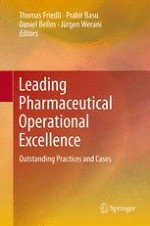2013 | OriginalPaper | Buchkapitel
20. Knowledge Exchange in Production Networks: Operational Excellence Multiplied
verfasst von : Simone Thomas, Fabian Liebetrau, Thomas Friedli
Erschienen in: Leading Pharmaceutical Operational Excellence
Verlag: Springer Berlin Heidelberg
Aktivieren Sie unsere intelligente Suche, um passende Fachinhalte oder Patente zu finden.
Wählen Sie Textabschnitte aus um mit Künstlicher Intelligenz passenden Patente zu finden. powered by
Markieren Sie Textabschnitte, um KI-gestützt weitere passende Inhalte zu finden. powered by
